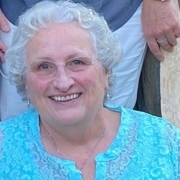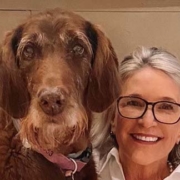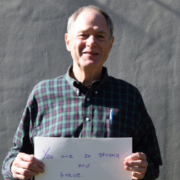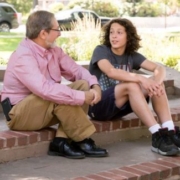Howard Hughes Found a Meaningful Volunteer Role as a CASA Advocate

Professor. Downhill skier. Globetrotter. Father and grandfather. Sailor. In 2020, Howard Hughes added to this impressive list when he made the decision to venture out of his comfort zone (something he’s fond of doing) and become a CASA volunteer advocate. Howard enjoys children so as he neared retirement he took his sister’s suggestion (a former CASA herself) and began looking into Court Appointed Special Advocates of New Hampshire.
Howard is now on his third case with CASA and the longtime educator is continually learning, a favorite hobby of his. At the start of his first case with a seven-year-old, Howard says he felt slightly “amnesic” about what a second-grader would be interested in. But his focus on interacting with children at their level is the important part; he can discover their interests and favorite activities along the way.
Howard has found that the role of a CASA can sometimes be challenging, but he has learned to use lots of persistence and some creativity to get around obstacles. He once texted a photo of himself to a parent with a message that Howard’s only job was to look out for the child. Howard reports this finally helped the parent feel comfortable to connect with him, as he could see that Howard was a kind person who was there to help.
Once, when trying to get two adversarial parents to work together for their child’s sake, Howard illustrated his point with a sports reference. “I told them that I was getting them all the same color t-shirt, so that we remember we’re on the same team. When sharing custody, the one thing you have together is your little girl. So let’s try to be teammates when it comes to her.”
And he’s learned about some of the factors that force children into the child protective system, including substance misuse. Before becoming a CASA, Howard had little knowledge of addiction. Yet all three of his cases largely hinge on the fallout caused by it. Here, he isn’t alone. Since the rise of the opioid epidemic, the majority of cases CASA takes on involve substance misuse—something most volunteers are inexperienced with when they first come to the program. This is why CASA works diligently to train volunteers and provide them with resources to increase their knowledge and awareness.
“Every parent I’ve worked with as a CASA has had obvious problems with opiates and other substances. And almost all of them claim that their parents had the same problem. This stuff gets transmitted from one generation to the next, but that doesn’t mean it’s genetic. There’s a cultural element.” But Howard knows that addictions don’t have to get passed on to the next generation. His hope is that through his work as a CASA, he can help the children he serves to have a better life than their parents and their grandparents have had.
Much of the knowledge and skills a CASA needs are learned in the pre-service training that they all receive. But some of it, Howard reports, you learn by doing. “It’s learning to pay attention to what’s going on to see if you can determine what might be beneath the surface.”
Since becoming a CASA advocate, one moment towards the end of his first case stands out as particularly meaningful to Howard. He met the father outside in a parking lot, and as they were walking around, the man told Howard that he’d decided that he wanted to be as good a dad as he could be—that he was going to let go of other things, and focus on that. “I told him ‘I just love it when you talk that way, that’s what we’re going for.’”
“There have been times like these where I have been driving home from meeting with a parent and their children, and it has put me in a fabulous, euphoric mood. Not to say that other times it hasn’t put me in a bad mood. It’s real life. I’m not discouraged because somebody has to try and help. To throw up your hands and do nothing isn’t going to solve anything,” Howard concludes.
If you would like to become a CASA volunteer, consider attending an upcoming virtual information session to learn more, or submit an application today.



 Volunteering with children who have experienced abuse, neglect, and trauma, Maureen Rowley, a Court Appointed Special Advocate (CASA) for 22 years, has seen sadness and heartache, but has also seen joy. She’s cheered on parents who battle back and arise victorious from the clutches of drug misuse in order to gain back custody of a beloved child. And she’s seen the miraculous transformation that can take place when a traumatized child is matched with the perfect adoptive family.
Volunteering with children who have experienced abuse, neglect, and trauma, Maureen Rowley, a Court Appointed Special Advocate (CASA) for 22 years, has seen sadness and heartache, but has also seen joy. She’s cheered on parents who battle back and arise victorious from the clutches of drug misuse in order to gain back custody of a beloved child. And she’s seen the miraculous transformation that can take place when a traumatized child is matched with the perfect adoptive family.
 Kathy Johnson has built a life on caring for others. During her career in nursing, she taught nursing students how to care for children with special needs. At home, she raised her four children, and is now a grandmother of 10 (not one to sit idle, Kathy crocheted a blanket for each grandchild last winter during the pandemic lockdown). So, it’s no surprise that after retiring in 2016, Kathy took on the role of CASA volunteer advocate. She had a coworker who was involved with CASA, and Kathy thought it sounded like the type of thing she would enjoy, and a good opportunity to give back to her community.
Kathy Johnson has built a life on caring for others. During her career in nursing, she taught nursing students how to care for children with special needs. At home, she raised her four children, and is now a grandmother of 10 (not one to sit idle, Kathy crocheted a blanket for each grandchild last winter during the pandemic lockdown). So, it’s no surprise that after retiring in 2016, Kathy took on the role of CASA volunteer advocate. She had a coworker who was involved with CASA, and Kathy thought it sounded like the type of thing she would enjoy, and a good opportunity to give back to her community.
 Patty Tollner has spent 12 years serving CASA of New Hampshire in multiple roles, from board member to volunteer advocate—some of that time with a special friend, her trained therapy dog Raisin, by her side. Like many people, Patty had heard about CASA through various channels over a number of years before the time was right for her to get involved.
Patty Tollner has spent 12 years serving CASA of New Hampshire in multiple roles, from board member to volunteer advocate—some of that time with a special friend, her trained therapy dog Raisin, by her side. Like many people, Patty had heard about CASA through various channels over a number of years before the time was right for her to get involved.








 After Seacoast New Hampshire resident Dean Plager retired, he enjoyed spending more time sailing, but he also felt a need to give back to society. He read an article about a local woman who was advocating for abused and neglected children as a volunteer with CASA of NH. “It hit home for me because I had been looking for something to do that really makes a difference. This was it,” Dean says.
After Seacoast New Hampshire resident Dean Plager retired, he enjoyed spending more time sailing, but he also felt a need to give back to society. He read an article about a local woman who was advocating for abused and neglected children as a volunteer with CASA of NH. “It hit home for me because I had been looking for something to do that really makes a difference. This was it,” Dean says.

